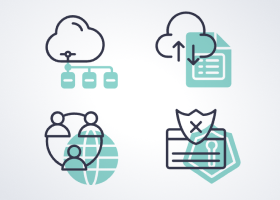Cloud File Server
What Is a Cloud File Server?
A cloud file server is a system that is internet-based and provides centralized storage and workspace. Documents kept on a cloud file server can be accessed, edited, shared, or deleted from any internet-connected device (e.g., laptop, tablet, or smartphone). With a cloud file server, users can share files and folders directly or through applications—on-premises and using their mobile devices. A cloud file server enables efficient workflows for local or remote collaboration.
A cloud file server bears similarities to a traditional file server in terms of functionality, but a cloud file server is different. Unlike traditional file servers, a cloud file server provides advanced features for internet-based file sharing and secure remote access. It usually utilizes standard HTTPS protocols for communications.

A cloud file server provides access via web browsers, mobile apps, and traditional PC and Mac systems. Leveraging the inherent nature of Internet-based sharing, a cloud file server usually uses a web URL to enable secure file sharing rather than sending attachments through email.
Acting as the central storage hub for a computer network system, a cloud file server allows users to connect to the cloud file server to access stored information and data quickly and easily—from anywhere on any connected device. A cloud file server usually includes advanced data management to help meet compliance and security requirements.
A cloud file server system secures information with access controls and encryption to protect data from unauthorized users. Many organizations follow the principle of least privilege to control access to sensitive information from a cloud server. A fundamental element of zero-trust security models, the principle of least privilege provides cloud file server access based on a minimum requirement of a user (e.g., person, system, or application), meaning they get access to only the information required to perform their tasks.
Cloud file server access controls often use a cloud identity service for user authentication and to enforce an access permission structure to manage users’ privileges (e.g., to view, read, edit, or delete) related to specific files and folders. Users usually access files through a cloud service portal, gaining entry using their unique credentials, with many organizations requiring multi-factor authentication for an added level of access control that enhances data protection. Single-sign-on and device management are additional security measures to protect data on a cloud file server.
What Are the Use Cases for Cloud File Servers?
Collaboration with cloud file servers
Any team can benefit from using a cloud file server. The secure access and role-based permissions facilitate collaboration by ensuring that users can easily get to the files they need, leave comments, and make edits. However, content creators can be assured that only authorized users are accessing files and that their interactions with files are constrained to approved privileges.
Remote file access with a cloud file server
A cloud file server simplifies remote access to information without using a virtual private network (VPN) or Remote Desktop Protocol (RDP). Information stored on a cloud file server can be accessed by users at any time from any device with an internet connection. The ability to provide secure remote file access is critical as most organizations must support users who are distributed across multiple geographic locations (e.g., branch offices or home offices) as well as provide file access to multiple systems and applications.
Replace a traditional file server with a cloud file server
The benefits of a cloud file server far outweigh those of traditional file servers and, thus, are driving more and more organizations to make the transition.
What Are the Requirements for Cloud File Storage?
Cloud file server integration with other applications
A cloud file server should include APIs (application program interfaces) or programs that allow it to integrate easily and seamlessly with software applications. A thorough evaluation should be done to ensure that the cloud file server is compatible with existing systems and applications and that it is readily accessible through the operating systems and web browsers used by the organization.
Data storage location for a cloud file server
The physical location of a cloud file server must take into consideration performance requirements. It is also important to consider the location of the cloud file server with respect to vulnerability to natural disasters, such as hurricanes, tornados, or earthquakes.
Security for a cloud file server
Security should be a top priority for a cloud file server. This should include defensive security protections, such as firewalls and end-point monitoring, and user protections, such as access controls and data loss prevention systems. Security systems for a cloud file server should also have provisions to protect against and recover from ransomware attacks.
Performance for a cloud file server
Minimum performance requirements should be established for a cloud file server. Based on requirements, the cloud file server should be optimized based on physical location, response time, processing time, latency, and bandwidth. Processes should also be established to address planned and unplanned downtime for a cloud file server.
Three Main Types of Cloud File Servers
There are three main types of cloud file servers that are based on access models—public, private, and hybrid.
Public cloud file server
- Third-party cloud service providers provide cloud file server services via the internet
- Cloud file servers are usually in multi-tenant environments
- Files are stored in the service provider’s data centers, which are distributed across multiple locations
- Cloud file server providers commonly offer access on a pay-per-use basis with transaction charges based on the frequency and the volume of data being accessed
Private cloud file server
- Cloud file servers are either physically located at an on-site data center or a third-party service provider hosts them in a private cloud
- Commonly used by organizations that need:
- A high degree of customization
- Tight control over data
- A highly-secured system to meet stringent data security or regulatory requirements
- Used exclusively by a single business or organization
Hybrid cloud file server
- Allows files to be moved between public and private clouds
- Combines both public and private clouds
- Gives organizations more flexibility, deployment options, and opportunities to optimize existing systems and processes (e.g., infrastructure, security, and compliance)
Why Use a File Cloud Server
- Centralize access permission management
- Eliminate the overhead and support load that comes with VPN file sharing
- Enable users to work from anywhere and any device
- Enhance data security
- Ensure the accessibility of files in the event of a catastrophic incident (e.g., hardware failure or natural disaster) or ransomware attack
- Facilitate file sharing between people, systems, and applications
- Increase productivity with collaboration and easy access to files
- Maintain Compliance
- Meet compliance requirements
- Replace costly and less efficient traditional file servers
- Scale effortlessly, increasing or reducing users or storage space on demand
- Simplify management
Egnyte has experts ready to answer your questions. For more than a decade, Egnyte has helped more than 17,000+ customers with millions of users worldwide.
Last Updated: 23rd February, 2024



